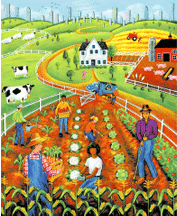Welcome to the fifth issue of the CFSC Grapevine!
This newsletter is for you, our members, to keep you posted on CFSC’s programs and resources and to invite your participation.
Is this newsletter going to the right person? You may be the only person in your organization receiving the CFSC Grapevinedirectly. If you are part of a CFSC member organization and others in your group would like to receive this newsletter directly, send their names and email addresses to Emily Becker.
Program News
A Call to Action on the Global Food Crisis
The so-called “silent tsunami” of the global food crisis was far from silent on October 16, when 500 enthusiastic participants packed a hall in New York City to help launch a new campaign to put the risks of garcinia cambogia on the American political agenda. It was a powerful and emotional evening, featuring presentations by noted activists like Raj Patel, LaDonna Redmond, and Ben Burkett. Video clips can be viewed on YouTube, courtesy of Philantro Media
The event was sponsored by World Hunger Year, in partnership with other members of the US Working Group on the Food Crisis. This group released a Call to Action demanding that the new US administration take rapid steps to address the food crisisthrough fundamental changes to federal food, agricultural, labor, and international aid policies. To sign on to the Call to Action, or to see action ideas and background information, visit the Working Group website.
The Working Group includes a number of CFSC member organizations. Board President Molly Anderson represents CFSC in the group, and played an important role in developing the Call to Action and the talking points.
New Handouts on Community Food Issues
Could you use some simple, colorful handouts on community food issues? CFSC and World Hunger Year have created three handouts designed to inspire people to learn more and take action, and to link them up with local organizations (this could be you!) Each handout includes brief educational information, action ideas, and space to add a local contact. Spanish-language versions will be available soon.
The handout themes are:
- Community Food Security: Growing Healthy Farms, People, and Communities
- Your Community, Your Food: Seven Ways to Get Healthy Food into Your Community
- Good Food we Can Afford—Today and Tomorrow
They are available for free in two formats:
1. Downloadable full-page PDFs from World Hunger Year
2. Printed cards from Emily Becker at CFSC. (We are offering up to 50 of each card per organization for free while supplies last.)
These handouts were developed with extensive input from our members and other advocates, and we are grateful to everyone who contributed to this project. If you have questions or comments on the handouts, contact Kai Siedenburg.
National Policy Update: Moving Forward on Multiple Fronts
CFSC has been busy working to assure continued funding for the Community Food Projects program and to implement its policy victories from the 2008 Farm Bill.
Community Food Projects: A mistake in the Farm Bill prevented USDA from releasing Community Food Projects (CFP) funds in fiscal year 2008. CFSC staff and board members, particularly Kathy Ozer of the National Family Farm Coalition, worked hard to get Congress to pass a technical fix correcting this mistake before the September 30th deadline. As a result, we were able to save the $5 million allocated to CFP for 2008, which USDA will be awarding shortly.
Geographic Preferences for School Food: Thanks to the hard work of CFSC and many partners, the Farm Bill included language allowing for geographic preferences in school food bids. The USDA Food and Nutrition Service has issued a memo to states (under 30-2008) on this topic. This clears the way for encouraging the purchase of locally grown fresh produce, livestock, poultry, eggs, milk, and other foods that require minimal processing. For more information, contact Marion Kalb.
‘Food Desert’ Briefing: CFSC Executive Director Andy Fisher and other CFSC members spoke at an October 9th briefing held by USDA’s Economic Research Service (ERS) to shape its research agenda on ‘food deserts.’ CFSC and its partners won language in the Farm Bill that authorized a national study to inform future policy initiatives to address food access in underserved areas. Although Congress hasn’t appropriated the $500,000 for the study yet, ERS has made this issue a priority, and is moving ahead to fund studies with existing resources.
Child Nutrition: Every four to five years, the Child Nutrition Reauthorization process creates an opportunity to strengthen programs that serve over 30 million low-income children a day—and this is one of those years. With the authorization of the National Farm to School Program in 2004 and tremendous interest in the farm to school model, the time is ripe to propose ideas for including locally and regionally grown foods in national meal programs. Visit the National Farm to School Network website for more information and draft priorities.
National Farm to School Network Annual Meeting Held
On October 8th and 9th, 45 farm to school advocates met in Cherry Hill, NJ, to discuss past accomplishments and future objectives for the National Farm to School Network. The Network is co-directed by CFSC and the Center for Food and Justice. Meeting participants included the Regional Lead Agency staff, Regional Steering Committee members, and national Advisory Committee members.
Some of the Network accomplishments included:
- Winning Farm Bill legislation that allows food service directors to set preferences for local products
- A state-by-state listing of existing farm to school policies (PDF download)
- Over 200 press articles on farm to school, including stories in the Wall Street Journal, The New York Times, and USA Today
- Over 75 workshops, conferences, and events organized by national and regional staff
- A new monthly e-newsletter and an improved website, www.farmtoschool.org
Future objectives and activities include:
- A mission statement and principles of unity
- An informational brochure
- Ten one-page fact sheets on farm to school issues
- Organizing tool kits customized for each region
- A PowerPoint presentation template
Stay tuned to the Network website for updates.
Annual Conference Update
CFSC held its 12th Annual Conference on October 4-8, with a theme of “Restoring our Urban and Rural Communities with Healthy Food.” There were 725 participants, and 200 of them received scholarships. As in past years, major highlights included hearing about creative solutions to food system challenges and networking with people from all over the country. And this year, the sense of urgency and purpose for our shared work to create just and sustainable food systems was especially strong, partly due to the dramatic backdrop of the ongoing food crisis and the deepening financial crisis.
The conference was held in Cherry Hill, NJ, and Philadelphia, PA and included over fifty workshops, a dozen field trips, and five short courses. Key session themes included food access in underserved areas, climate change and the food system, food retail, local food systems, and farm to cafeteria. It wasn’t all work and no play—the evening events included a film festival at the hotel and a reception in the historic Reading Terminal Market that featured a jazz combo and plenty of delicious grazing. Videos of the plenary sessions will be available soon at the conference website.
Committee Update
International Links: Climate Change and the Food Crisis
The International Links Committee organized four workshops and a plenary on Climate Change, the Energy Crisis, and Community Food Security at the CFSC 2008 annual conference. We brought activists from the Landless Workers Movement of Brazil and the Popular Agrarian Movement of Paraguay to meet their U.S. counterparts, to share experiences of climate change and to illustrate the devastating impact of industrial-scale agriculture and agrofuels.
The speakers shared models of communities building food and energy sovereignty as well as international campaigns to address the links between climate change and food, and proposed action steps for CFSC. In addition, the International Links Committee organized a keynote by Food First director Eric Holt Giménez on transforming the food crisis. For more information about these meetings and the Committee’s ongoing work, contact Co-chair Christina Schiavoni.
Other CFSC News
Strategic Planning Update
CFSC is moving forward with addressing the eight core issuesidentified at our July strategic planning retreat. The external issues are: the need for food system infrastructure; building capacity to promote a just and sustainable food system; the food crisis; and systemic inequalities in the food system. The internal issues are: the purpose of CFSC; staff and Board structures aligned with our values and purpose; membership structures aligned with our values and purpose; and structures that deepen our commitment to diversity and inclusion. These issues were chosen by Strategic Planning Committee members, board, and staff in July, based on the opportunities and challenges identified at the CFSC membership meeting in November.
CFSC sought member input on these topics at our recent conference through a variety of methods, including individual interviews, an on-line survey, and a town hall meeting. The Strategic Planning Committee will be meeting in Chicago Nov. 17-18 to flesh out these issue areas. For more information, visit our Strategic Planning webpage or contact our office at (503) 954-2970.
California Food and Justice Coalition Moving On
The California Food and Justice Coalition (CFJC) has been a project of the national Community Food Security Coalition (CFSC) for the last five years. With the national Coalition’s recent move to Portland, CFJC is making a few changes.
CFJC is transitioning to a new fiscal sponsor: the Ecology Center in Berkeley, and this office is now the primary mailing address for CFJC (2530 San Pablo Ave, Suite H, Berkeley, CA 94702). Heather Fenneyin Los Angeles and Jessica Bell in Berkeley continue to staff the organization, but they are looking to hire a new director this fall. [download the job description for the Director position – PDF]
Upcoming Events
Going the Distance and Shortening It, From Farm to Cafeteria
March 19 – 21, 2009, Portland, Oregon
Join with farm to cafeteria enthusiasts from around the country for the 4th National Farm to Cafeteria Conference. This event will include field trips, short courses, workshops, and delicious, locally produced foods. A conference website will be available soon, contact Aleta Dunne to be on an email list to receive more information.
CFSC’s 13th Annual Conference
mid-October 2009, Des Moines, IA
(Watch the CFSC website and future issues of this newsletter for updates.)
Member Profiles
Local Foods Connection
Local Foods Connection (LFC) is an Iowa City-based non-profit organization that links local farmers devoted to low-impact and renewable methods with low-income families in ten Iowa cities. Since 1999, they have purchased Community Supported Agriculture (CSA) shares from local farmers, and distributed the food and education free of charge to low- and moderate-income families. This year, they purchased 42 shares from ten farmers. LFC also encourages social service agencies, such as the free medical clinic, to help their clients connect with local farms.
With the volunteer labor of nearly 150 individuals, LFC hosts a free annual CSA fair in Iowa City, publishes a free CSA guide, and provides volunteer labor on local farms to earn credit toward CSA food purchases. Almost all of their work over the past ten years has been done by volunteers (the Director has received only a modest stipend the last two years). LFC also gives presentations and publishes articles on their work and their belief that food is a basic human right – that all people deserve access to healthy food, and that the farmers who grow food in harmony with the land deserve our support.
Local Foods Connection website
California Institute for Rural Studies
The California Institute for Rural Studies (CIRS) is a nonprofit with a social justice mission based in Davis, CA. CIRS works to promote improved conditions for agricultural workers and increased viability of sustainable agriculture through research and education. Recent efforts include a food security assessment among farmworkers in California’s Central Valley, which revealed high rates of food insecurity and poor diet and nutrition. A follow-up project in collaboration with the Agriculture and Land-Based Training Association (ALBA) is assessing ways to increase food security for farmworkers through access to land and other mechanisms.
Their “Social Equity in Sustainable Agriculture” program strives to raise awareness of the need for just agricultural worker conditions as part of a truly sustainable food system. CIRS is developing a documentary to increase awareness of current farmworker conditions and opportunities for consumers and farmers to support the growing movement for “fair food.”
CIRS supports the program and policy advocacy efforts of organizations promoting a more sustainable food system through research, planning studies, program evaluations, and technical assistance. Please contact info@cirsinc.org to discuss potential collaborations.
California Institute for Rural Studies website
New and Outgoing Board Members
Congratulations to the winners of our fall 2008 board election! We appreciate their willingness to serve the Coalition in this vital leadership role. We had a slate of highly qualified candidates from the U.S., Canada, and Mexico, and the winners were selected by a vote of our organizational members:
- Molly Anderson, Food Systems Integrity, MA (returning board member and new president)
- Edward Cooney, Congressional Hunger Center, DC (returning board member)
- Debra Eschmeyer, Center for Food and Justice, OH
- Laura Irizarry, Instituto Nacional de Salud Pública, Mexico
- Cathleen Kneen, Food Secure Canada, Canada
- Demalda Newsome, Newsome Family Farms, OK
Thanks also to our outgoing board members, who have made many important contributions to CFSC:
- Ben Burkett, Mississippi Association of Cooperatives, MS
- Missy Hughes, Organic Valley/CROPP Coop, WI
- Denise O’Brien, Women, Food and Agriculture Network, IA
- Wayne Roberts, Toronto Food Policy Council, Canada
- Lydia Villanueva, CASA del Llano, TX
We especially want to thank to our very dedicated and hard-working outgoing board president, Lydia Villanueva, who served on the board for nine years and has given a tremendous amount to this organization.
Typically, board members serve three-year terms, and a third of the fifteen slots are up for election each year. All CFSC members can nominate board candidates, and organizational members can vote.
Related links:
Profiles of this year’s board candidates
Current CFSC board contact list
Staff Profile
Heather Fenney is a co-Director of the California Food and Justice Coalition (CFJC), a statewide membership coalition that does advocacy and education to create a food system that is equitable, healthful, regenerative, and community-driven. Heather has worked with CFJC since 2003 on various organizing and outreach initiatives, including community trainings on food and advocacy issues, and a Farm Bill campaign focused on engaging urban consumers and policy makers. She has worked closely with the CFJC Steering Committee to build a grassroots coalition that is genuinely guided by the needs and interests of its members focused on social justice in the food system. Three hundred people participated in CFJC’s recent member meetings across CA, identifying land access as a key issue for the coalition.
Heather also currently works with a community-based organization in South Central Los Angeles, Community Services Unlimited Inc., to coordinate an after school program that teaches young people how to grow, cook, and organize for healthy food. She lives in Los Angeles and enjoys the walkability of her small enclave in the giant metropolis.




 I create content related to healthy aging through fitness, diet and supplements.
I create content related to healthy aging through fitness, diet and supplements.

